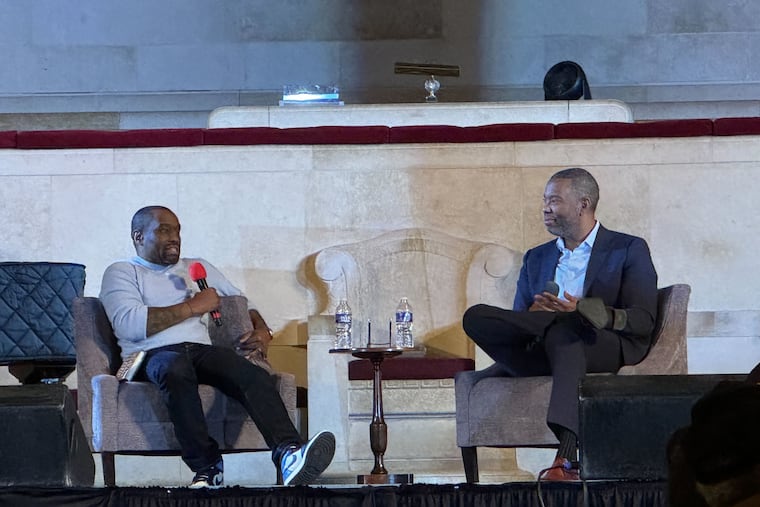Ta-Nehisi Coates comes to Philadelphia with a powerful ‘Message’ about being able to tell your own story
Ta-Nehisi Coates' deft prose reminds us what's at stake before we head to the polls.

When essayist, author, and Howard University professor Ta-Nehisi Coates discusses his writing, he pleads with readers, begging them to look beyond his awards, his clever turns of phrase, his brilliant descriptions, and feel — like really feel — his truth.
“I kill myself over those sentences,” Coates said to an audience of 1,800 on Monday from the altar of the chapel of Girard College. Coates was a guest of Marc Lamont Hill, a fellow journalist, professor, and owner of Uncle Bobbie’s Coffee & Books in Germantown.
Uncle Bobbie’s and WHYY collaborated to host the evening, one of several literary coups this year that include a visit from Supreme Court Justice Ketanji Brown Jackson and the rapper Eve, both of whom released memoirs this fall.
“Those sentences are not ornaments, they are not empty objects of beauty,” said Coates, whose seminal memoir, Between the World and Me, turned him into a renowned commentator on Generation X’s lived Black experience. His 2014 Atlantic article “The Case for Reparations” restarted a larger discussion about what was taken, and what is owed, to Black Americans.
“This isn’t just the icing on the cake,” Coates continued. “This is the cake. Because to the extent to which I can [clarify and write] moving, haunting sentences that really get you there, is to the extent that I am understanding the thing.”
Coates’ frank discussions is what makes his appearance in Philadelphia, in the days before our nation’s most consequential presidential election, so powerful and timely.
Coates’ freedom to tell a story through his eyes, and share it on podiums and in classrooms, is exactly what is in danger if the political party that wants America to be great again wins the presidency.
Truth and humanity
The Message — a nod to Grandmaster Flash and the Furious Five’s 1982 rap — is slim but dense. Framed as a letter to Coates’ Howard University writing students, Coates insists young scribes write from their experiences, travels, and revelations, not the expectations of editors. A young writer’s mission, Coates says, should be “nothing less than to save the world.”
Truth is the weapon.
Coates takes us on a journey to find his truth in The Message. We visit Dakar, Senegal; Columbia, S.C.; and the West Bank, sitting with him as he lets go of long-standing impressions he’s had of Africa, the Deep South, and the Middle East. Coates does not want to repeat the tropes, he’s interrogating them, banishing them to form new insights and his truth.
“I don’t want you reading The Message and thinking, ‘Wow that was an interesting, relatively correct book,’” Coates said on Monday. “You are supposed to read The Message and when you get up, it’s all you can talk about. You go to your partner … and say, ‘Have you read this? You have got to read this.’”
The theme that underlines his book is about who gets to tell stories, and what power those stories have. When a group of people are treated like “the other” in their own story, inhumanity toward them grows and thrives. When people are allowed to tell their truth, their humanity becomes real in their eyes and the eyes of others.
In Dakar, Coates discovers a city brimming with beautiful humans with rich lives, not Africans of movies and his imagination. In South Carolina, he discovered his work is valued by Southern whites who use his book to open the minds of children in a small-town school. In Israel and the West Bank, where the bulk of the book is situated, he cites a statistic from historian Maha Nasar, that says from 1970 to 2019 in this country’s papers and magazines, less than 2% of all opinion pieces discussing Palestine had Palestinian authors.
“Human beings have a great difficulty committing inhuman acts to other people without some obfuscation that makes it OK,” Coates said at the event. “Everyone wants to be the hero in the story. For those of us who live under the weight of that obfuscation, we live under the weight of that all of our lives. Half of our work is clearing it out. It’s understanding what is exactly true.”
This reminds Coates of the African American experience. It reminds me of that experience, too.
Vote like your story’s at stake
Like Coates, I have spent the bulk of my career explaining the humanity of Black people — specifically Black women — in newspaper columns to justify my existence in the newsroom and the world.
Sometimes, even as I worked to discredit tropes, I unwittingly furthered them, upholding the status quo. I was forced to retreat, when my “objectivity” was questioned by editors.
After George Floyd’s murder at the hands of Minneapolis police officers, the Philadelphia Inquirer formed a newsroom-wide focus group that has created new polices for news-gathering that treat people of color with humanity. My colleagues and I have written more stories, essays, and columns reflecting this more shared humanity. We’ve only broken the ice. We still have work to do. But everyone in our newsroom is aware that the stories of people of color matter.
It’s not lost on me that Coates is on tour centering the importance of storytelling in the days before a presidential election that threatens to reverse the small strides people of color have made in the media, publishing, and in classrooms.
With the ongoing war in Gaza, I’ve heard people of color say they are going to sit this election out, refusing to vote for either Harris or Trump.
I would argue voting is more important than ever, especially if we want journalists, artists, and storytellers to continue to tell truthful, nuanced stories from our perspective.
In this way, reparations might just come in a better future for ourselves and our children.